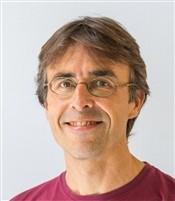FACTSHEET
MASTER’S PROGRAMME
CONTEMPORARY THEATRE, DANCE AND DRAMATURGY
Dear students,
Welcome to the MA Contemporary Theatre, Dance and Dramaturgy programme at Utrecht University. For most of you this will be the first time you set foot in the city of Utrecht and at Utrecht University Hence, this guide will help you find your way around the university, the programme, and the city a little more easily.
This MA programme is part of the MA Arts & Culture, which also includes programmes on Gender Studies, Applied Musicology and Arts & Society. During this programme you will encounter various members of our Theatre, Dance and Performance Studies staff at Utrecht University. Next to this MA programme, the staff also teaches in the (Dutch) BA Media and Culture Studies, and in the Research MA Media, Art and Performance Studies Several PhD researchers (with various institutional backgrounds) complete our team and you may encounter some of them as well, during your studies with us.
This guide contains useful information about the MA Contemporary Theatre, Dance and Dramaturgy at the Department of Media and Culture Studies (Faculty of Humanities): included are the academic year calendar, a list of teachers and committees, as well as the names of student advisors and related student services It also contains a brief introduction to the study programme and provides you with some practical information, such as student’s communication, libraries and Internet facilities. You will find extensive information on the study programme on our website, where you will also find some recommendations for theatre, dance and performance festivals. Through our bimonthly newsletter, we will keep you posted on interesting performances, conferences, lectures and so on throughout the year.
We hope that this guide will help you in finding your way at Utrecht University! If you have any further questions, check the website students.uu.nl/en/hum/contemporarytheatre- dance-and-dramaturgy or ask your fellow students or your supervisor, and if this leaves your question still unresolved, do not hesitate to contact the programme coordinator.
In case you come across useful information for other (prospect) students during your time here, please let us know, so we can include it in next year’s edition! Enjoy your stay in Utrecht!
The staff of MA Contemporary Theatre, Dance and Dramaturgy
N IBBELINK is Assistant Professor in Theatre and Performance Studies. Her research areas include dramaturgy & scenography; ecology, new materialism and performance theory. She incidentally works as a dramaturg and artistic advisor.


R
A
M
is Assistant Professor in the Department of Media and Culture Studies Theatre and Performance Studies, where she teaches in the MA Contemporary Theatre, Dance and Dramaturgy. CHECK
D R . L IESBETH G ROOT
D
.
NIKA
ARSCHALL
OUT OUR WEBSITE
INTRODUCTION
What can theatre tell us about everyday life in a digital culture? How does dance inform and shape society? How can we analyse, interpret and respond to this as critical thinkers? In this programme we will jointly investigate and reflect on the dynamic ways in which theatrical and choreographic practices engage with a society in transition.
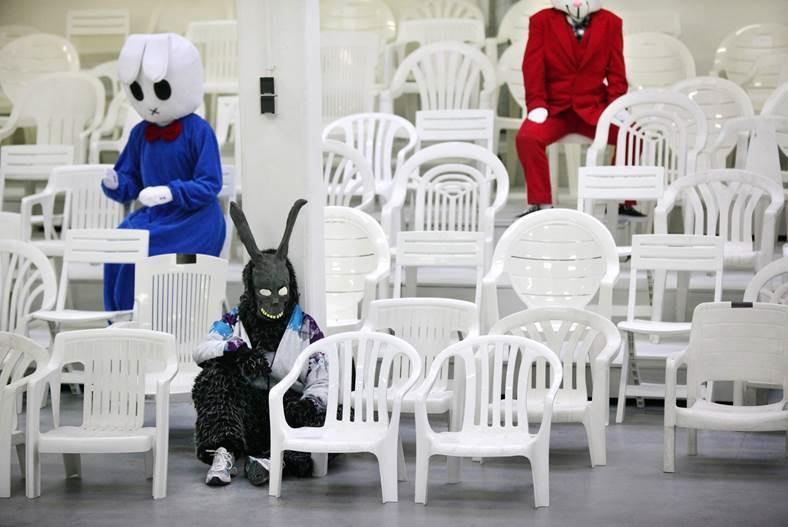
Contemporary performance practices are increasingly hybrid projects that approach and transcend the borders of theatre, dance, visual arts, music, media and daily life. Theatre and dance are inextricably linked with other media that shape our reality; they extend beyond the theatre’s walls and inject themselves into our daily lives. The expansion of performance does not only pertain to practices, but to theories as well. Theories and concepts derived from the performing arts are progressively deployed in critical and cultural theory and (social) science. Such a field in transition demands an approach that studies theatre and dance as intermedial and interdisciplinary phenomena, and addresses the interrelationships of these phenomena, the audience and the socio-cultural context.
This dynamic is the focus of our Contemporary Theatre, Dance and Dramaturgy programme. In the programme, we will reflect on and contextualise these developments, in order to help you in becoming a performing arts professional, who is able to articulate (dramaturgical) observations and to analyse emerging trends and theories. This program develops your skills in studying artistic making processes, in inspiring that process, and in maintaining a productive dialogue with various partners in these creative processes (performers, directors, designers, theorists). You will get acquainted with doing research for a variety of ends: dramaturgical and theoretical research, research for conferences, debates or festivals, and fieldresearch on emerging trends and topics. Through a range of (group) assignments and meetings with practitioners and scholars, you are able to train verbal and professional communication skills relevant to the field. Above all, you will develop your writing skills, so that by the end of the programme, you will know how to articulate your thoughts, how to build an argument, how to think dramaturgically and critically. You will learn how to make sense of and be sensitive to current developments in the field, and will know why such skills are vital instruments for engaging with contemporary theatre, dance and performance.
DO YOU WANT TO PARTICIPATE?
The curriculum committee (Opleidingscommissie, OC) is a representative advisory body that deals with the quality of the education of the Master programmes within the Department of Media and Culture Studies. The committee consists of a teacher section (three teachers) and a student section (three students), one student from each Master.
What are the CC's duties? Students complete a course evaluation for each course at the end of each block. The CC then evaluates the courses on the basis of this course evaluation and reports on them during meetings with the rest of the CC. In addition, the CC issues advice about the Education and Examination Regulations (EER or in Dutch OER) after an evaluation of this OER. Finally, the CC advises the programme board on all sorts of matters concerning education.
For the current members of the OC, have a look at: https://students.uu.nl/en/hum/contemporary-theatredance-and-dramaturgy/contact/curriculum-committee. If you’d like to become a member on the committee, please contact the master’s coordinator!
Photo: Sanne Peper
WHO IS WHO
■ ■■
MAAIKE BLEEKER , CHAIR THEATRE STUDIES , is Professor in and Chair of Theatre Studies. In her research she combines performance and dance studies with media theory and philosophy, engaging with questions about perception, cognition, embodiment, in particular related to science and technology. She was also chair of Performance Studies international. She is the project leader of the Acting Like a Robot research group at UU. Course: In the 2023-2024 season, Prof. Bleeker does not teach in regular courses.
LIESBETH GROOT NIBBELINK , PROGRAMME COORDINATOR , is Assistant Professor in Theatre and Performance Studies. Her research areas include dramaturgy & scenography; ecology, new materialism and performance theory, and transdisciplinary research methods. She is co-founder of Platform-Scenography, a transdisciplinary platform of scenographers, scholars and dramaturges. She incidentally works as a dramaturg and artistic advisor. Courses: Contemporary Performance: Mapping the Field and Performance Research Lab: Act 1
T HERON S CH MI DT is Assistant Professor in Theatre and Performance Studies, and has worked internationally as a writer, teacher, and performer, with a special interest in bridging theory and artistic practice, collaborative and experiential modes of research and learning, activist movements and art for social change.
Courses: Theories & Concepts of Theatre, Dance and Dramaturgy and Performance Research Lab: Act 1 ■
A L L isassistant professor in the Department of Media and Culture Studies at Utrecht University, where she teaches in the MA Contemporary Theatre, Dance and Dramaturgy Her research is invested in issues of theatre, asylum and migration, socially engaged arts and activism, intersections of race, class and gender in contemporary European performances, diversity and representation in theatre’s institutional life, decentering knowledge and the stage.
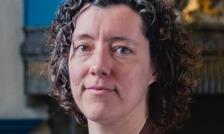
Course: Theatre in Dramaturgical Practices
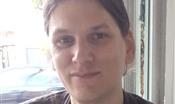
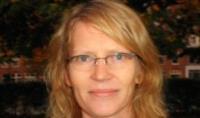

■ ■ ■
L AURA KARREMAN is Assistant Professor in Dance and Performance Studies. Her research is situated at the interdisciplinary intersection of dance transmission practices, digital technologies and critical approaches of embodiment. She engages with questions about movement and representation and investigates notions of performance as knowledge. She has acted as a dramaturge in the Dutch theatre and dance field.
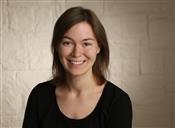
Courses: Expanding Performance and Performance Research Lab: Act II.
■
KONSTANTINA GEORGELOU is Assistant Professor in Dance and Performance Studies. Her research is on the practice and theory of dramaturgy, from a political perspective, which is part of her ongoing inquiry on embodied practices of resistance and forms of dis/order as these are thought and expressed within contemporary dance. She also teaches at University College Utrecht and at DAS Choreography and Theatre in Amsterdam, and works with several artists as a dramaturg and artistic advisor
Courses: Dramaturgical Practices: Theatre and Dance, group 1 –Contemporary Dance

■ ■ ■
■ ■ ■
A N I K A M A R S H
■ ■
■ ■
DICK ZIJP is Assistant Professor in Theatre and Performance Studies His research interests are contemporary theatre and performance, humour and comedy, critical cultural theory. Next to his work at Utrecht University, he is also active as a theatre critic. Courses: Supervision MA Thesis and Internship.
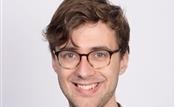
SUPERVISOR
During the first month of the programme, each student will be assigned a personal supervisor, who is a member of the academic staff. The supervisor is a reference point throughout the year, and will monitor your progress and advise you on questions or problems you may encounter. The supervisor will also supervise your MA Thesis and MA Internship. In case of special circumstances, you are advised to go to the study advisor. Together with the study advisor, and in dialogue with the supervisor, we will then discuss ways to adjust your study plan.
■ ■ ■
PROGRAMME INFORMATION
Programme outline
The programme aims to train independent thinkers who are able to critically reflect on contemporary performance. This means that you will get thoroughly acquainted with the latest trends in theatre, dance and dramaturgy as well as with contemporary critical and theoretical approaches that are relevant to these developments
The rationale behind the programme’s structure is based on two learning trajectories: one is oriented towards introducing you to developments in theatre, dance and dramaturgy, both theoretically as well as related to practice; the second trajectory focuses on the development of research, academic and professional skills.

More precisely, in block 1 all the activities are oriented towards acquiring knowledge of the field by introducing you to actual debates in academic discourse (Theories & Concepts of Theatre, Dance and Dramaturgy) and contemporary developments in the field (Mapping the Field), and through their combination, learning how to apply theory and concepts in performance analysis. In Performance Research Lab: Act 1, we will introduce you to methods and methodological debates in the field and explore various modes of doing research. In block 2, we will focus on extended fields of research (Expanding Performance) and upon practical and theoretical knowledge of dramaturgy in theatre or in dance (Dramaturgical Practices: Theatre and Dance). You may also opt for exchanging one of these courses for an elective course from the related MA Arts & Culture programmes (more on the elective courses below). Additionally, in Performance Research Lab: Act 2, you will start mapping the field of your own research interest; you learn to compose a thesis proposal and a work plan for the internship. In block 3 you complete your thesis, and the research internship in block 4 allows you to get actively engaged with the professional field.
COURSE PLANNER: You will find more information on this programme’s courses in the Course
Planner: https://cursusplanner.science. uu.nl/english/study/AC-CPRF16

In a scheme, the Contemporary Theatre, Dance and Dramaturgy programme looks like this: Block 1
Performance Research Lab: Act I (5 EC, compulsory)
Theories & Concepts of Theatre, Dance and Dramaturgy (5 EC, compulsory)
Contemporary Performance: Mapping the Field (5 EC, compulsory)
Block 2
Performance Research Lab: Act II (5 EC, compulsory)
Elective: Expanding Performance (5 EC)
Elective: Dramaturgical Practices: Theatre and Dance Group 1: Contemporary Dance (5 EC) or Group 2: Contemporary Theatre (5 EC)
One of the elective courses can be exchanged for an elective course from the MA Arts & Culture programmes
Blocks 3 and 4 MA Thesis (15 EC, compulsory) MA Internship (15 EC, compulsory)
Click on the individual course for more information. Or visit the Courseplanner: https://cursusplanner.science.uu.nl/english/study/AC-CPRF-16
Part-time track
For those who have opted for the part-time track of this programme, the scheme looks like this.
First year
Block 1, year 1
Block 2, year 1
Performance Research Lab: Act I (5 EC, compulsory)
Contemporary Performance: Mapping the Field (5 EC, compulsory)
Elective: Expanding Performance (5 EC) or Dramaturgical Practices: Theatre and Dance Group 1: Contemporary Dance (5 EC) or Group 2: Contemporary Theatre (5 EC)
Blocks 3 and 4, year 1 MA Internship (15 EC, compulsory)
Second year
Block 1, year 2
Block 1, year 2
Theories & Concepts of Theatre, Dance and Dramaturgy (5 EC, compulsory)
Performance Research Lab: Act II (5 EC, compulsory)
Elective: Expanding Performance (5 EC) OR
Dramaturgical Practices: Theatre and Dance Group 1: Contemporary Dance (5 EC) or Group 2: Contemporary Theatre (5 EC) OR
Elective course from related MA programmes
Blocks 3 and 4, year 2 MA Thesis (15 EC, compulsory)
An additional note on the Dramaturgical Practices course: in this course we work with two workgroups (Group 1: Contemporary Dance, Group 2: Contemporary Theatre). You can switch work groups during the change of enrollment days on 23th and 24th of October. It is also possible to take both work groups (counting as two elective courses). For this option, you will need to ask permission from the Exam Committee If you
are interested in this option, contact the programme coordinator. The coordinator will provide you with a letter of support, to be added to the request for the Exam Committee. Take a look at: students.uu.nl/en/hum/contemporary-theatre-dance-and-dramaturgy/practical-information/academic-policies-and-procedures. Due to administrative reasons, we will register one of the workgroups as Individual Course, whereas the other group is registered as the Dramaturgical Practices course.
Meet the makers & transmission in motion
Partly integrated within the courses and occasionally an extra-curricular event, we organise a number of meetings with practitioners and researchers throughout the year. We use these sessions to focus on specific research projects or actual developments in the field. Previously, we held sessions on for instance theatre and disabilities studies; performance art and participation; performance, memory, and technology; dance and neuroscience; theatre and diversity. More information is available at https://transmissioninmotion.sites.uu.nl/meetthemakers/ and https://transmissioninmotion.sites.uu.nl/ You can also subscribe to the TiM Newsletter via tim@uu.nl.
Second semester
In the second semester you will work on your MA Thesis and the MA Research Internship. Specific guidelines will be provided in the Course Manual Second Semester and on our website. To support your work in the second semester, we organize five group tutorials, dedicated to to sharing your (learning) experiences regarding thesis and internship with your fellow students. The group tutorials serve to stimulate your reflection on internship activities, to follow your progress regarding the thesis, and to help to get a grip on academic writing processes. Helpful comments, tips, good and bad practices, problems and solutions will be exchanged in an open atmosphere. The majority of these group tutorials will be peer-to-peer coaching sessions. Attending these sessions is mandatory. Therefore, when organising your internship, make sure that you are able to be present. We will only make exceptions for students whose internships are abroad. Following the group tutorials in the morning, the afternoon we proceed with student-led Open Space Labs: sessions that are programmed/curated by the students, for instance by inviting a guest (dramaturgs, programmers, artists, etc.), to organize a workshop, to share practices, etc. More information will be provided during the programme.
CAREER ORIENTATION
During your programme, you will improve your knowledge of and work on academic and professional skills. However, it is advisable to prepare yourself for your future career also in other, more practical and explicit ways, by considering the following phases: reflecting on your motivation and work values, researching your opportunities on the job market, creating ties with potential employers and practicing skills as needed for job applications and job interviews. This way, you will establish yourself as a professional.
The following outline shows the career orientation events per block. Some of these events are mandatory, and others are optional. Sometimes they are related to a course and sometimes they are organised at department level. Some of these events are explicitly geared towards career development, while others help you to develop professional skills that are relevant on the job market.
Mapping the Field: in this course you attend and engage in an international performance festival, allowing you a better understanding of the practice of festival programming.
Dramaturgical Practices: both work groups train dramaturgical skills through encounters with art practitioners and exploring different modes of writing.
The peer-led Group Tutorials (mandatory) in block 3 and block 4 will help to reflect on your internship and research experiences with your fellow students, including possible problems or challenges you might have encountered along the way.
Your internship will enable you to put your skills and knowledge into practice and to actively start building your net- work. Think about how you can stay in touch with the professionals you met during your internship after you have completed your job.
Internship Lab I (mandatory): this lab focuses on preparing for the internship and searching one. A selection of interesting internships is presented, and you will discuss plans with your supervisor.
Internship Lab II (mandatory): this lab helps you preparing for the internship. We also invite alumni to this session. You will also meet your supervisor to discuss your progress in finding an internship.
Career Services offers the workshop ‘How to perform as a professional’.
Preparing for the afterlife I: we invite you to become member of our alumni LinkedIn group (www.linkedin.com/group s/8 466367).
Preparing for the after- life II: as a welcome change of scenery from doing your internship or writing your thesis, find someone interesting in your LinkedIn group and meet up for coffee to discuss his or her job!
Alumni have a right to the services of Career Services up to half a year after graduation. Check out what they have to offer and don’t hesitate to make use of their services!
CULTURE
Venues and festivals for dance, theatre and performance
During your studies, you will visit several theatres and festivals as part of your education. We have created an indicative list of festivals in Utrecht and other places in the Netherlands that can help you orientate yourself. Take a look at: students.uu.nl/en/hum/contemporary-theatre-dance-and-dramaturgy/curriculum/culturalactivities
Block 1
2
3
4
Block
Block
Block
IMPORTANT FOR HUMANITIES STUDENTS
New students students.uu.nl/hum-new
Practical information for new students at the Humanities faculty.
Academic calendar students.uu.nl/hum-calendar
Information about days off, course registrations and change-of-enrolment days.
UU online

Information about our online systems and how to log in: students.uu.nl/hum-online In need of a manual? IT manuals: https://manuals.uu.nl/en
REGISTRATION, PROCEDURES, INTERNSHIP INFO
Student Information Desk Humanities students.uu.nl/hum-contact
Programme related matters, such as
• course registration
• course schedules
• study results & study progress (Osiris)
• graduation
Student Services students.uu.nl/en/contact/student-services
Studying at Utrecht University in general:
• registration as a UU student

• tuition fees
• elite athletes
• disability or chronic illness
Internship coordinator students.uu.nl/hum-internshipcoordinator


Information about:
• guidelines and procedures
• internship placements
QUESTIONS ABOUT ENTERING THE JOB MARKET
Career Services students.uu.nl/hum-careerservices
Advice on getting a job after graduation through workshops, CV check-up, and coaching. Your programme coordinator will inform you about programme-specific events.
NEED EXTRA HELP?
Study advisor: students.uu.nl/hum-studyadvisor






Student psychologist: students.uu.nl/psychologist
Workshops: Skills Lab: students.uu.nl/en-skillslab
THINKING OF GOING ABROAD?
International office Humanities: students.uu.nl/hum-io
OTHER FACILITIES
University Library: students.uu.nl/hum-library
Olympos sports centre: olympos.nl/en-us/home.aspx
Parnassos cultural centre: uu.nl/en/parnassos
FACT! You can find your grades, student card and timetable in the MyUU portal and the MyUU app: students.uu.nl/en/myuu and students.uu.nl/en/ myuu-app
FACT! In the second semester, you will have to register in Osiris for courses you wish to attend. If you want to switch courses, you can do so on the change-ofenrolment days before the start of the relevant block.
FACT! Deadlines are always listed in the course syllabus, which your lecturer will provide approximately 2 weeks prior to the course’s ’start.
FACT! If you need more information about specific aspects of your programme, e.g. internships or thesis, please see the Curriculum page on the programme website via students.uu.nl/hum.
FACT! Check students. uu.nl/hum-studentlife for information about living, jobs, sports and leisure in Utrecht!
© June 2023. Utrecht University, Faculty of Humanities. Every effort has been made to ensure that the information presented in this factsheet is correct and up to date Utrecht University cannot be held liable for any false, inaccurate, or incomplete information presented herein











